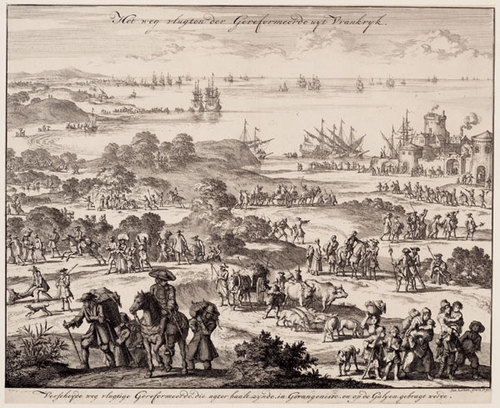31/10/2006
Huguenots
Temple Neuf, Metz
From Moselle to Berlin, the roads to exile

From Moselle to Berlin, the roads to exile
The exhibition directly concerns the history of France, and more particularly that of the Moselle region. The persecutions following the Revocation of the Edict of Nantes in October 1685 had chased the Calvinist Protestants out of France, fleeing to other European countries: England, the United Provinces and the German States, in particular to Brandenburg and Berlin, where they greatly contributed to the cities’ prosperity. Why and how did they leave? What direct or indirect roads did they follow? Why were they welcomed with open arms by the foreign governments? How did they the host country finally integrate them? The exhibition tries to answer all of these questions.
Two hundred thousand Protestants in exile
In the XVIIth century the region of Moselle had various Huguenote communities, event though the Protestant population in Metz had been reduced since the XVIth century and only represented 4 500 souls in 1685. Just a few days following the signature of the Revocation Edict, the temple of Metz, as well as that of Courcelles-Chaussy were ransacked and then destroyed. The departure of 3 000 residents in the years that followed deprived Metz of 15 % of its working population. The number of Protestants to be listed in the census of some 150 communities of the Moselle region was no better. Among this exiled population there were many peasants and wine growers, as well as many artisans, scientists, intellectuals and notables. Metz and the Moselle region, as well as all of France, lost a great quantity of «arms and brains» in this adventure, qualified by historian Pierre Chaunu as «a misfortune for France » and «a blessing for Germany». In total 200 000 Protestants, that is nearly one third of the members of this religion, decided to abandon the French soil rather than join the groups of «new converts».
In France and in the countries of refuge
The exhibition is organized in two parts: the presentation of the political and religious situation in France prior to the Revocation of the Edict of Nantes and the events that pushed the Huguenots to exile. A specific study is focused on the situation of Metz and the Moselle region. The welcoming and integration of the Huguenots in the countries of refuge is the subject of the second part. Berlin and the Brandenburg region occupy a central position. Personal diaries have been found, written by Huguenots during their life in Metz before the Revocation, on the road to exile and during their integration in their adoptive country. These stories guide us through the exhibition. The itinerary is illustrated by 170 objects, paintings, museum pieces, documents from archives, books and engravings from French and German public collections. Given the wealth of the subject, which touches a great number of families in the Moselle region, the exhibition, prepared in close partnership with the Deutsches Historisches Museum of Berlin, is a major contribution to the understanding of the region’s history as well as that of France and Germany.
Illustration: Psalter said "of the hair bun". Collection of two psalters. 1753-1754. Paris, Society of the History of French
Temple Neuf
Place de la comedie - Metz
Opening hours: Monday from 2am to 6pm Tuesday to Thursday from 10am to 6pm Friday from 10am to 8pm
Week-ends & Bank holidays from 10am to 7pm
Admission: Full price: 6,50€ Concessions (individual): 5€ Concessions (groups from 15 persons): 4€ / pers
Guided tour (1 guide for 25 persons): 52 €



